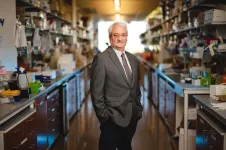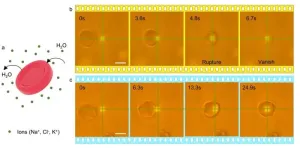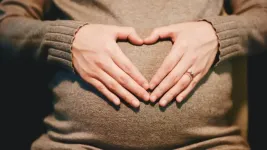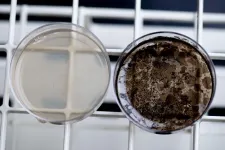(Press-News.org) DURHAM, N.C.— A new Duke University-led study finds that Gulf War Illness (GWI), which affects approximately 250,000 U.S. veterans, significantly reduces their white blood cells’ ability to make energy and creates a measurable biochemical difference in veterans who have the disease.
“Historically, GWI has been diagnosed based on a veteran’s self-reported symptoms, such as exercise-induced fatigue, indigestion, dizziness, insomnia, or memory problems. There’s been no objective biochemical or molecular measurements doctors could use to diagnose it,” said Joel Meyer, professor of environmental genomics at Duke’s Nicholas School of the Environment, who led the new study.
The new study provides measurements accessible in blood samples, which, though not sufficient to serve as a stand-alone diagnostic test, could be useful to help improve treatment for veterans suffering from Gulf War Illness by giving doctors a new way to assess whether a prescribed treatment is helping, Meyer said.
“Knowing this is an energetic deficiency can help us zero in on more effective ways to relieve the symptoms,” Meyer said. “Blood tests, repeated over the course of the treatment, would show if a veteran’s white blood cells are responding to a treatment and producing more energy.”
He and his coauthors from Duke, the U.S. Department of Veteran Affairs’ War-Related Illness and Injury Study Center, and the New Jersey Medical School published the new peer-reviewed paper Nov. 1 in the open-access journal PLOS ONE.
Their research reveals that Gulf War Illness inhibits white blood cells’ energy production by impairing the workings of the cells’ mitochondria, structures within the cell which extract energy from food and convert it into the chemical power needed to fuel growth, movement and other bodily processes and functions. Mitochondria are often referred to as the ‘power plants’ of the cell.
“The idea to investigate the role mitochondria might be playing in GWI came from Mike Falvo, one of my coauthors from Veteran Affairs and the New Jersey Medical School, who had noticed that a lot of GWI symptoms were similar to those associated with mitochondrial diseases,” said Meyer. “So, we analyzed mitochondrial respiration and extracellular acidification, which are proxies for energy generation, in the white blood cells of 114 Gulf War veterans, 80 of whom had been diagnosed with GWI. We also looked for evidence of mitochondrial DNA damage and nuclear DNA damage.”
The analyses revealed no evidence of DNA damage, but they did show significantly lower levels of extracellular acidification and oxygen consumption in the white blood cells from veterans with GWI—signs that their mitochondria were generating less energy.
Follow-up blood tests on about a third of the veterans showed that some of these levels could vary over time, but the general pattern remained: the cells of veterans with GWI produced less energy.
The cause of Gulf War Illness is still unknown. To determine if environmental factors might play a role, Meyer and his colleagues turned to the veterans’ surveys of self-reported symptoms and their written recollections of their deployments.
“We found veterans who recalled being exposed to pesticides and pyridostigmine bromide, a drug used during the Gulf War as a pretreatment to protect troops from the harmful effects of nerve agents, were more likely to get GWI after deployment,” Meyer said. “An interesting question is how these effects have persisted so long after the exposures.”
Coauthors on the new paper were William Pan and Ian Ryde of Duke; Thomas Alexander, Jacquelyn Klein-Adams and Duncan Ndirangu of the U.S. Department of Veteran Affairs’ War-Related Illness and Injury Study Center (WRIISC); and Michael Falvo of WRIISC and the New Jersey Medical School at Rutgers Biomedical and Health Science.
Funding came from the Office of the Assistant Secretary of Defense for Health Affairs through the Gulf War Illness Research Program (W81XWH-16-1-0663), with additional support from the U.S. Department of Veterans Affairs Clinical Sciences Research and Development Service (#I01 CX001329). The conclusions, opinions, interpretations and recommendations contained in the paper are those of its authors and are not necessarily endorsed by the Department of Defense or Department of Veteran Affairs.
CITATION: “Bioenergetic Function is Decreased in Peripheral Blood Mononuclear Cells of Veterans with Gulf War Illness,” Joel N. Meyer, William K. Pan, Ian T. Ryde, Thomas Alexander, Jacquelyn C. Klein-Adams, Duncan S. Ndirangu and Michael J. Falvo. PLOS ONE, Nov. 1, 2023, 2023. DOI: 10.1371/journal.pone.0287412
END
Gulf War Illness significantly reduces white blood cells’ ability to make energy
VA physician noticed symptoms parallel to mitochondrial diseases
2023-11-01
ELSE PRESS RELEASES FROM THIS DATE:
Wistar scientists engineer new NK cell engaging immunotherapy approaches to target and potentially treat recalcitrant ovarian cancer
2023-11-01
PHILADELPHIA—(Nov. 1, 2023)—The Wistar Institute’s David B. Weiner, Ph.D., executive vice president, director of the Vaccine & Immunotherapy Center (VIC) and W.W. Smith Charitable Trust Distinguished Professor in Cancer Research, and collaborators, have engineered novel monoclonal antibodies that engage Natural Killer cells through a unique surface receptor that activates the immune system to fight against cancer.
In their publication titled, “Siglec-7 glyco-immune binding MAbs or NK ...
PLOS Complex Systems and PLOS Mental Health now open for submissions!
2023-11-01
SAN FRANCISCO —The Public Library of Science (PLOS) is pleased to announce that PLOS Complex Systems and PLOS Mental Health are now open for submissions. Both journals have a strong community of editors who will represent the full diversity of the research communities we aim to serve.
PLOS Mental Health is an inclusive journal led by Editors-in-Chief Charlene Sunkel and Rochelle Burgess, working alongside staff Executive Editor Karli Montague-Cardoso and in collaboration with a diverse Editorial Board. The journal is seeking research that addresses challenges and gaps in the field of mental health research, ...
The remains of an ancient planet lie deep within Earth
2023-11-01
In the 1980s, geophysicists made a startling discovery: two continent-sized blobs of unusual material were found deep near the center of the Earth, one beneath the African continent and one beneath the Pacific Ocean. Each blob is twice the size of the Moon and likely composed of different proportions of elements than the mantle surrounding it.
Where did these strange blobs—formally known as large low-velocity provinces (LLVPs)—come from? A new study led by Caltech researchers suggests that they are remnants of an ancient planet that violently collided with Earth billions of years ago in the same giant impact that created ...
New twist on optical tweezers
2023-11-01
Optical tweezers manipulate tiny things like cells and nanoparticles using lasers. While they might sound like tractor beams from science fiction, the fact is their development garnered scientists a Nobel Prize in 2018.
Scientists have now used supercomputers to make optical tweezers safer to use on living cells with applications to cancer therapy, environmental monitoring, and more.
“We believe our research is one significant step closer towards the industrialization of optical tweezers in biological applications, specifically in both selective cellular surgery and targeted drug delivery,” ...
Stigma felt by opioid-dependent moms impacts the health care received by their babies
2023-11-01
COLUMBIA, Mo. -- The rate of opioid use among pregnant women in the United States quadrupled between 1999 and 2014 and continues to rise — an alarming trend that researchers from the University of Missouri and University of Iowa say has exposed the stigma felt by opioid-dependent mothers and how their shame has negatively impacted the health care received by their infants.
Jamie Morton led a study, which was a metasynthesis of existing literature on the topic, as a doctoral student at the MU Sinclair School of Nursing. She said the findings can help ensure health care providers, family ...
The ringed seals in Ilulissat Icefjord, Greenland are special
2023-11-01
Exploring Arctic nature can be difficult. Harsh conditions and great distances are significant challenges when researchers want to coax secrets out of nature.
However, a research project, led by Greenlandic and Danish researchers, has now succeeded in describing a new type of ringed seal that lives in the Icefjord near Ilulissat in West Greenland; a unique natural area on the UNESCO World Heritage List.
The results have just been published in the renowned scientific journal Molecular Ecology.
A small population
Over ...
NRL ISS Mission seeks new bioinspired materials
2023-11-01
WASHINGTON – The U.S. Naval Research Laboratory’s Melanized Microbes for Multiple Uses in Space Project, or MELSP, will use the International Space Station (ISS) to search for production of melanin variants and other useful biomaterials that can have applications both on Earth and in space. The mission is scheduled to launch in early November 2023.
Melanin is described as a group of biopolymers responsible for various biological functions, including pigmentation of skin, hair, and iris of the eyes, which helps protect body ...
Pinpointing HIV immune response
2023-11-01
New research combining computer modeling and experiments with macaques shows the body’s immune system helps control human immunodeficiency virus (HIV) infections largely by suppressing viral production in already infected cells while also killing viral infected cells, but only within a narrow time window at the start of a cell’s infection.
“To eliminate HIV, we have to understand how the immune system attempts to control the infection,” said Ruy M. Ribeiro, a theoretical biologist at Los Alamos National Laboratory who led the development of the model ...
First mice engineered to survive COVID-19 like young, healthy humans
2023-11-01
Researchers have genetically engineered the first mice that get a human-like form of COVID-19, according to a study published online November 1 in Nature.
Led by researchers from NYU Grossman School of Medicine, the new work created lab mice with human genetic material for ACE2 – a protein snagged by the pandemic virus so it can attach to human cells as part of the infection. The mice with this genetic change developed symptoms similar to young humans infected with the virus causing COVID-19, instead of dying ...
As people live longer, family caregivers face financial challenges
2023-11-01
PHILADELPHIA (November 1, 2023) – Many people overlook the short- and long-term costs of financial caregiving, a growing problem that financial advisors and employers can help address, according to a new report by the TIAA Institute and the University of Pennsylvania School of Nursing (Penn Nursing).
One in five adults now provide uncompensated care to loved ones with health problems, and the report provides a comprehensive compilation of insights and research that underscores how the caregivers face a ...
LAST 30 PRESS RELEASES:
Birds change altitude to survive epic journeys across deserts and seas
Here's why you need a backup for the map on your phone
ACS Central Science | Researchers from Insilico Medicine and Lilly publish foundational vision for fully autonomous “Prompt-to-Drug” pharmaceutical R&D
Increasing the number of coronary interventions in patients with acute myocardial infarction does not appear to reduce death rates
Tackling uplift resistance in tall infrastructures sustainably
Novel wireless origami-inspired smart cushioning device for safer logistics
Hidden genetic mismatch, which triples the risk of a life-threatening immune attack after cord blood transplantation
Physical function is a crucial predictor of survival after heart failure
Striking genomic architecture discovered in embryonic reproductive cells before they start developing into sperm and eggs
Screening improves early detection of colorectal cancer
New data on spontaneous coronary artery dissection (SCAD) – a common cause of heart attacks in younger women
How root growth is stimulated by nitrate: Researchers decipher signalling chain
Scientists reveal our best- and worst-case scenarios for a warming Antarctica
Cleaner fish show intelligence typical of mammals
AABNet and partners launch landmark guide on the conservation of African livestock genetic resources and sustainable breeding strategies
Produce hydrogen and oxygen simultaneously from a single atom! Achieve carbon neutrality with an 'All-in-one' single-atom water electrolysis catalyst
Sleep loss linked to higher atrial fibrillation risk in working-age adults
Visible light-driven deracemization of α-aryl ketones synergistically catalyzed by thiophenols and chiral phosphoric acid
Most AI bots lack basic safety disclosures, study finds
How competitive gaming on discord fosters social connections
CU Anschutz School of Medicine receives best ranking in NIH funding in 20 years
Mayo Clinic opens patient information office in Cayman Islands
Phonon lasers unlock ultrabroadband acoustic frequency combs
Babies with an increased likelihood of autism may struggle to settle into deep, restorative sleep, according to a new study from the University of East Anglia.
National Reactor Innovation Center opens Molten Salt Thermophysical Examination Capability at INL
International Progressive MS Alliance awards €6.9 million to three studies researching therapies to address common symptoms of progressive MS
Can your soil’s color predict its health?
Biochar nanomaterials could transform medicine, energy, and climate solutions
Turning waste into power: scientists convert discarded phone batteries and industrial lignin into high-performance sodium battery materials
PhD student maps mysterious upper atmosphere of Uranus for the first time
[Press-News.org] Gulf War Illness significantly reduces white blood cells’ ability to make energyVA physician noticed symptoms parallel to mitochondrial diseases






